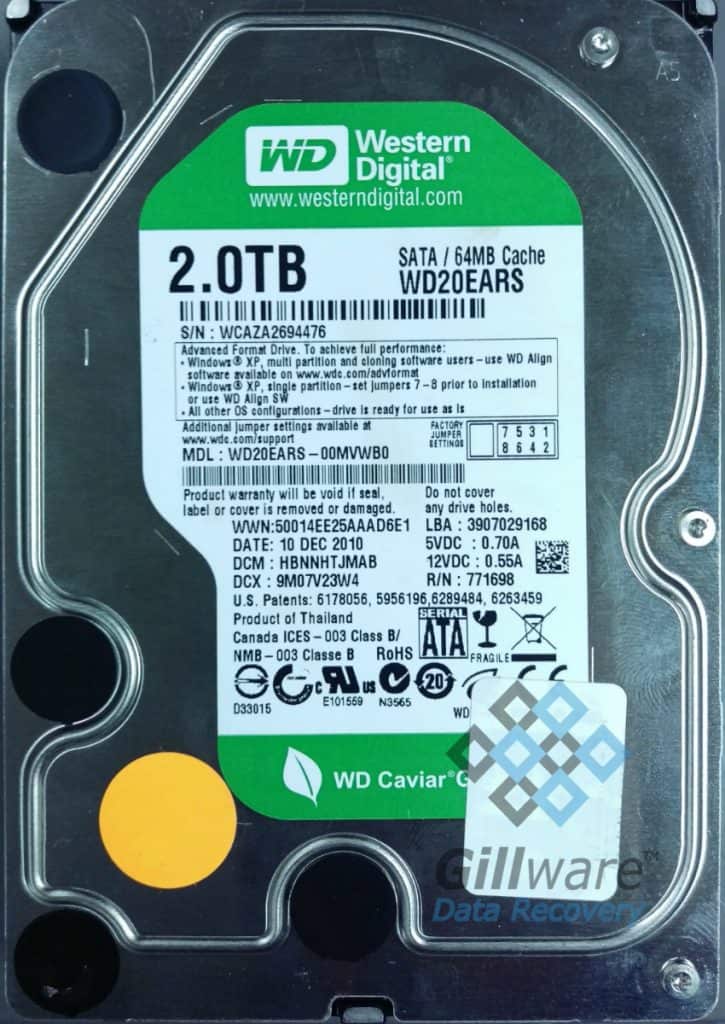Slow Hard Drive: My Book Data Recovery
The client in this Western Digital My Book data recovery case had a terminally slow hard drive. Eventually, after a few weeks of life in the slow lane, the client’s hard drive finally became inaccessible. Unfortunately, the client hadn’t managed to pull off their critical data before that day came, leaving them empty-handed when their hard drive shed its mortal coil. So they brought their unresponsive hard drive to Gillware Data Recovery for our hard drive repair services.
Slow Hard Drive Recovery Case Study: My Book Data Recovery
Drive Model: Western Digital WD20EARS-00MVWB0
Drive Capacity: 2 TB
Operating System: Windows
Situation: Hard drive ran slowly and eventually became completely unresponsive
Type of Data Recovered: Photos and videos
Binary Read: 26.5%
Gillware Data Recovery Case Rating: 9
Inside Your Slow Hard Drive: Why I Can’t Drive 55
Like people, hard drives tend to slow down as they get older. Their parts get worn out. They can’t think quite as quickly. But what makes your hard drive slow down? Rarely is the spindle motor that spins your hard disk platters the culprit. Your hard disk platters still comfortably spin at their designated speed (usually 5,400 or 7,200 RPM). No, what makes your hard drive slower are usually its read/write heads.
Hard drive performance decreases with age, especially as the drive fills up and the data on it becomes more spread out across the disks. The more data you have, and the more spread-out it is, the harder your read/write heads have to work and the longer they have to search to find it. Not only does this lead to increased latency and seek times, but it also puts increased stress on your read/write heads. The headstack is already the most delicate of your hard drive’s internal components.
If you’ve ever wondered why defragmenting your hard drive is so important (and why it speeds your computer up), it’s because the data you write to your drive is rarely contiguous. That is, every block that makes up a file you create doesn’t necessarily exist end-to-end on the same track on your hard disk platter, or even on the same surfaces of the platter. Sometimes, the hard drive has to shuffle data around as part of its normal operation. This makes the read/write heads travel farther and take longer to read data. Defragmenting, as its name suggests, reorganizes your data to make things a little easier for your read/write heads.
But sooner or later, those read/write heads wear out. Eventually, like the client in this unresponsive hard drive recovery case, your drive will slow down and die as its headstack deteriorates.

Unresponsive Hard Drive Recovery
When your hard drive finally gives up the ghost after it dies of old age, there’s a good chance it’s read/write heads haven’t completely failed yet. In our data recovery lab, our engineers have seen plenty of cases where an unresponsive hard drive’s heads still worked—but only just barely. In many of these cases, the client was simply fortunate and prudent to have brought the drive to us right away, instead of trying to run the drive and inadvertently killing its heads.
When a slow hard drive finally gives up the ghost, that doesn’t necessarily mean its read/write heads have gone totally blind. It’s common for our engineers to encounter read/write heads that have simply become terminally slow, often leading to firmware troubles. They may take half a minute or more to read a single 512-byte sector! Your computer would see this behavior as a sign of terminal failure and boot your hard drive off before it could read a single sector. But fortunately for you, our engineers aren’t recovering data with your computer. We use our own, specially-designed, fault-tolerant recovery platform, HOMBRE.
Data Recovery Results
With the help of our special tools, a skilled engineer can sometimes deal with the under-performing heads of a slow hard drive without the need of an invasive headswap procedure. In this Western Digital data recovery case, our engineers repaired this slow hard drive’s bugged firmware and fully recovered 94.6% of the client’s files without doing any invasive cleanroom work. All of the client’s most critical photos and videos were successfully recovered, with no file corruption or “gaps” in the files impacting the quality of the recovery. We rated this unresponsive hard drive recovery case a 9 on our ten-point scale.
When your hard drive, be it internal or external, starts running slowly, it might need some housekeeping to put a little more spring in its step. Or it could be dying. Unfortunately, unless you’re truly obsessive about monitoring your hard drive’s health, it’s hard to be sure if your hard drive is about to bite the dust until it does. If you want to avoid a trip to the data recovery lab, make sure you back up your files!
